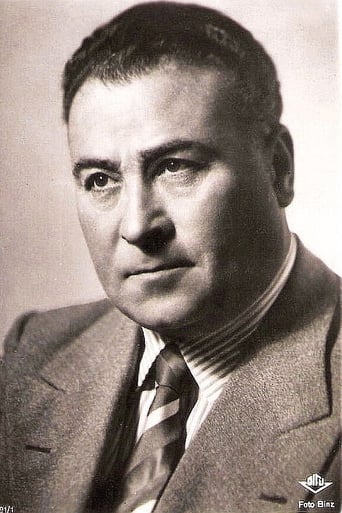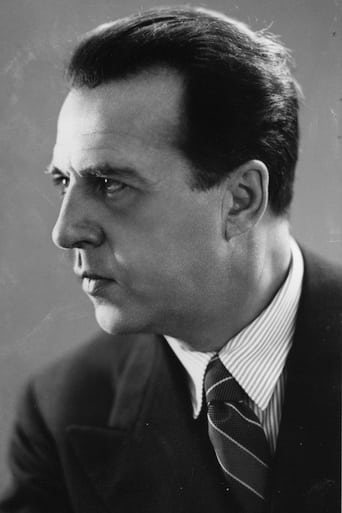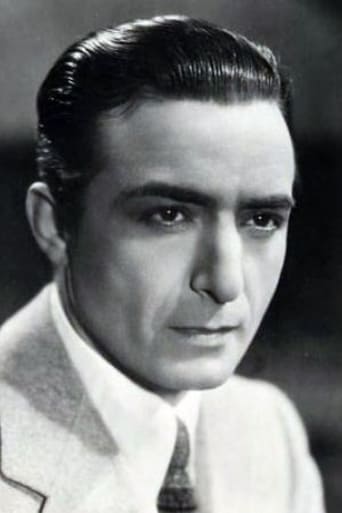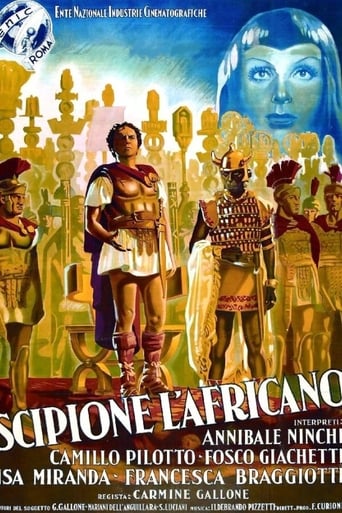
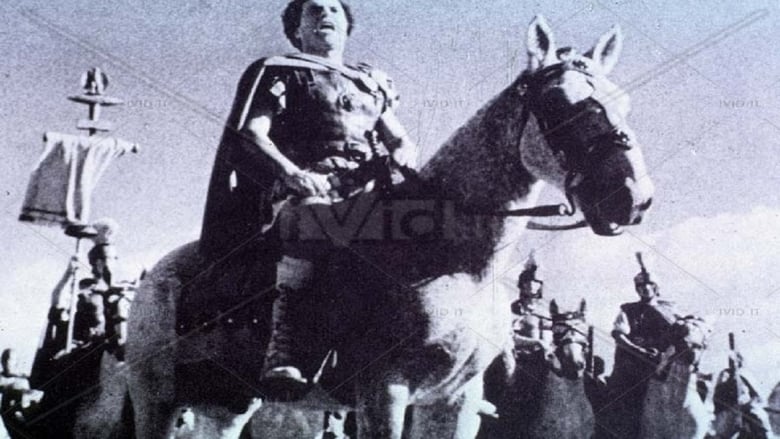
Scipio Africanus: The Defeat of Hannibal (1937)
A story of the Second Punic Wars, beginning with Scipio's futile pleas to the Roman Senate to build an army to battle Hannibal, that climaxes with the battle of Zama.
Watch Trailer
Cast


Reviews
SCIPIO AFRICANUS is an Italian historical epic of 1937, telling the story of the Romans and their wars against the invading Hannibal and his army. This was made under the influence of the dictator Mussolini and thus it functions as a propaganda movie more than anything else. It's lavishly mounted for sure, with a great number of extras in the battle scenes, but at the same time the individual scenes are wooden and too obviously staged, lacking life. And I can't recommend a film that features real-life violence meted out to elephants, not matter how good or bad it is.
Pretty bad. Visually a mesh of Italian Futurist motifs and imitations of the Nazi "Triumph of the Will," with doses of peplum tossed in for good measure - but not the peplum of heroic action scenes (the action scenes in this movie - only two - are so poorly edited they are simply confusing) but that of the dull cloak-and-dagger intrigue subplots that drag down the lesser muscle-man films and Italian epics. Lotsa posturing and talk, talk talk. Some striking images, but they are all painfully static - the editing is atrocious.The scenes with the elephants are painfully ugly, and just a reminder of the essential cruelty of the politics behind this film.Produced by Vittorio Mussolini at the urging of his father 'Il Duce.' Some moments constitute effective propaganda, but that the film only played a week in Italy tells us that by the date of its release, Italians were getting tired of the same old lies.And whatever the facts, thematic lies abound - the central premise of the film appears to be that, since an African nation had invaded Italy 2,000 years ago, this justified Italy invading another African nation (Ethiopia) in the 1930s - huh?! A grim reminder that Mussolini had slipped into some kind of fantasyland and was bent on bringing Italy down with him.Looney, messy, arrogant, dull. Only for students of the history of Italian Fascism, or that of propaganda in general.
I was very much looking forward to watching this film on DVD but was sorely disappointed by the IHF Region 1 edition which reproduces the 83 minute American edition (dubbed in English), thus robbing the viewer of 24 minutes of the original film. More than elephants were butchered in this version... This was done in order to reduce an almost 2 hour long epic film to a little actioner that could easily be programmed on a double bill in the US. Much of the melodrama - which is the most worthwhile and typical part of this film - has been cut so that the historical love triangle of Syphax, Sophonisba and Messinissa (which was also covered in the silent Italian classic "Cabiria") is cut down to the bare minimum, making this story a poor man's version of "Cleopatra". Another romantic subplot of separated Roman lovers is also cut short but its main elements remain, i.e. the woman is violated by Hannibal, she misses her chance to assassinate him when he shows his more human side and she eventually dies in the arms of her lover, any happier outcome being considered immoral in those days, I suppose. It is also difficult to follow the geography of the events since most of the comings and goings have been excised. The disc box boasts "digitally restored from the original film master". I don't know which "film master" they mean but the only apparent "digital" restoration seems to be the transfer of the mono track to a 2.0 track. The picture itself has been severely cropped right and bottom (black bars being visible at times at the left and at the top of the picture), with the result that the feet of characters are often missing in action even in an non-overscanned progressive scanning mode. The 20 minute final battle scene has been preserved for obvious reasons - besides the economic one that it didn't need much dubbing. It is the kind of brutal spectacle that film directors have been trying to keep out of their epic battles for decades and which will provide unsavoury thrills to the more sadistic part of the audience. The political propaganda aspects of this film have to do with the Romans' humane treatment of prisoners (and even animals in one scene) contrasted to the barbarian habits of the Carthaginians ravaging Italy. On the film's defense, it must be noted that in matters of war, Scipio was mostly on the side of the angels, according to historical accounts. The music has been dialed down in this dubbed version so we are not given much of a chance to appreciate the sometimes funereal, quasi-religious music used for the prelude to battle, the operetta-like jaunty marches used for the conquering Roman army and the Verdi-like choruses of the Roman population. Still, the number of extras is impressive as are the Cinecitta sets of ancient Rome. As this is an important, historical film, I think it deserves to be shown in its original, uncut Italian version, preferably in a truly restored state.
In this movie we have more sympathy for Hannibal with one eye (Camillo Pilotto) than for Scipio (Annibale(!) Ninchi) because Hannibal has so much pathos. Mussolini said: "Il cinema é l'arma piu forte". This movie received his personal "Mussolini cup" award for best Italian film of 1937, but one doubts if today this movie would be regarded as a propaganda-movie. Scipio won his last battle against Hannibal indeed, but by hurting elephants in a cruel way. There is a scene where a Roman officer prohibits a Roman soldier to launch his spear at a baby-elephant who was in the battle with his mother. It is a horrible sight to see an elephant receiving a spear in his eye, or falling down after having a spear in his leg. The elephants are crying out their pain and despair and one feels more pithy for them than for the dying soldiers. Anyway, the tactics of Scipio made it possible to let the elephants go through the lines of the hastari (Roman infantry) so they could not crash the Romans. At one moment in the battle the Gallic soldiers of Carthago (Spain was occupied by Carthago) fall back but Hannibal doesn't want them to fly and they are killed by the Carthagenian spears. The politics in the movie are well explained: the Council of the Elder of Carthago falling on their knees to have Hannibal back and the Roman Senate which is very angry because the Carthagenians break the truce. Some historical persons are not very clear (Captain Massinissa, Queen Sophonisba, King Syphace) but for the Italians of that time who knew their national history, included the Roman history, they will have understood their importance. The dialogues are realistic and they show also the relevance of the fact that the Carthagenians had more a mercenary-army and the Romans more an army of civilians. But at the end, both generals, Scipio and Hannibal cry the same: "Rome or Carthago or dead!". For the Carthagenians their future was at stake. Carmine Gallone, the director, made in 1960 thus 23 years later, another movie about Carthago: "Cartagine in fiamme". Was this a sequel?


